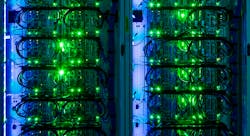Dell Technologies, HPE Pursue Multiple Paths Into the Enterprise AI Business
If your business is a consumer of enterprise-class computer hardware, there is a really good chance you are a customer of one of the world’s top two server manufactures, Dell Technologies and Hewlett Packard Enterprise (HPE). Together they control a third of the worldwide sales of server hardware, and if you focus on North America, the percentage is even higher.
You are also likely aware that neither of these technology giants offers their own cloud service. IBM, the only other US company in the top 5 in server sales, does offer its own AI cloud product based on its Watson AI technology, as we previously discussed when reviewing the leading AI cloud vendors.
Both companies have gone from seeing superscaler cloud providers as competition to their hardware businesses, to potential partners to the Dell and HPEs customers, with the hardware giants now being in the middle, providing hardware for on-premises and colocation solution, software stacks for integrating major cloud providers, and the expertise to enable their customers to maximize the value of all of the components of their hybrid infrastructures.
The fact the most businesses have found themselves in hybrid cloud and multi-cloud environments means that the expertise that HPE and Dell can bring to their customer base, especially in integration and management of often disparate platforms, provides a future direction for these businesses.
Both HPE and Dell have increased their involvement with data center colocation over the last few years, understanding that hybrid clouds are the direction most customers are heading. This means that their focus has moved far beyond just equipping the customer data center, but also understanding the concerns of colocation specialists and working with both the customers and the colos to deploy the individualized solutions that the customers are demanding.
What Do I Need to Know?
So what are Dell and HPE doing to give their customers the support they need to harness AI as a business tool? There are a lot of similarities between the offerings of these two companies along with areas of expertise that stand out for both.
Both companies are not only vendors of server hardware but also of enterprise-scale storage solutions. This makes them very aware of the value of the data being stored and provides clarity in their understanding that their AI solutions are going to be focused on unlocking the value of that data. To a large extent, both companies' AI solutions understand that data is the key to a successful result.
Both companies offer as-a-service options that can provide a cloud-first and cloud anywhere approach to AI. HPE Greenlake and Dell Apex can both deliver on-premises, off-premises, and cloud hybrid solutions to solve AI needs. Both services support a unified, multi-cloud experience that can be built using your existing technologies as well as a broad selection of as-a-service offerings in both public cloud and on-premises versions.
For example, both companies offer solutions for Microsoft Azure Stack, enabling hybrid and edge computing applications to be built and managed consistently across locations. This enables diverse workload needs to be addressed where, and how the capabilities are required.
Both pay-as-you-go services are scalable as needed, both up and down, and offer access to the full range of technologies offered by each company as well as selected best-of-breed applications that address specific needs that may not be offered within their native product portfolios. Of course, both companies would like their customers to integrate their consulting, management, support, and education services into their customers’ IT operations, becoming, if they were not already, their primary trusted IT partner.
Focusing on Flexibility
The key takeaway here is that both companies want customers to not only be able to build on top of the existing infrastructure that they currently run but also to create the specific operational AI environment that the customer needs, while maximizing the value of their installed infrastructure; servers, storage, and networking. Allowing the customer to create their new AI infrastructure, from machine learning to generative AI while continuing to utilize the data they’ve previously collected for functions such as AI training and inference.
Both companies have partnered with Nvidia to bring its AI hardware to customers in multiple ways, from dedicated hardware to pay-as-you-go cloud services. You can spin up AI environments, from bare metal to containers, to VMs, as necessary using their on-demand services.
Dell, however, has taken a specific approach with their Validated Designs for AI program, which much like the services available from cloud vendors such as Amazon and Microsoft offer pre-tested and optimized configurations for specific sets of AI workloads, such as automated machine learning, conversational AI, and intelligent video analysis.
HPE, in contrast, can provide the same services but does not yet offer the large set of pre-validated designs that Dell promotes. They do, however, support a single pane of glass view via the HPE Greenlake-enabled management tools that can provide many, if not all, of the services Dell makes available, albeit not is the same fashion. User can spin up services directly from the Greenlake console, as well as manage their existing services.
What Sets Them Apart?
Curiously enough, where the two companies differentiate most obviously are at the opposite ends of the spectrum. Dell provides a full line of AI tools and software running on their Dell Precision Workstations. They offer versions optimized for machine learning, deep learning, and artificial intelligence, all of which are key components for building your future AI enabled workflows. Featuring Xeon CPUs and Nvidia GPUs, this hardware offers the state-of-the-art technologies for building, training, and developing your AI workflows. HPE does not compete in the dedicated workstation space; when Hewlett Packard split into two companies in 2015, desktop computing stayed with the original HP, while enterprise computing went to HPE.
Dell also offers its PowerEdge servers in configurations for AI workloads, giving customers natural development path for their workflow. All of their AI server options are available via their Apex for artificial intelligence as-a-service solution.
HPE comes from a more top-down approach as it is the developer of what is currently (as of the Top500 list from 11/2022) the fastest supercomputer in the world, Frontier, which lives at the Oak Ridge National Laboratory. This 1.1 exaflop computer was, as of the testing date, faster than the next seven computers on the list, combined. Now given that it is unlikely that a business is going to invest in a dedicated hardware resource at that level or that there will be capacity available on Frontier for your company to utilize, what does this mean for your business’ AI future?
HPE is bringing components of their Cray supercomputers to enterprise computing. At more rational enterprise computing price points and available via their pay-as-you-go edge to cloud platform, HPE Greenlake. This means being able to deploy the level of HPC you need, at scale, from your Greenlake console.
Both companies offer a range of HPC server products that can meet the needs of most customers. They take a different approach to the design and scaling of systems at that level and investing in hardware at that scale places a business in rarified company. While HPE is in the business of building supercomputer such as Frontier, Dell”s role in supercomputing has primarily been providing hardware for purpose-built systems like the Frontera academic supercomputer, a 5.5 petaflop system at the Texas Advanced Computing Center.
Business Will Continue to Change Quickly
It is important to note that both companies understand that hybrid computing and the hybrid cloud is where the industry is moving. Each company will enable the support, at different levels, of the third-party cloud services offered by the superscalers. This will also include support for dedicated AI cloud offerings that are starting to appear, such as the Nvida DGX H100 -based cloud and hardware that will soon be making its availability to the general public.
This has been just a broad outline of what the leading server vendors are doing to stay abreast of the technology changes driven by the increase in demand for AI solutions for business. On one hand, AI creates a massive demand for appropriate hardware and infrastructure to support its workflows. On the other hand, the hardware is only a small part of the entire picture, with businesses looking at the results, not the journey. The demands that AI will place on manufacturers, developers, operators, and data centers is in flux, and how this all shakes out over the next few years will be interesting to watch and a little scary to participate in.
About the Author



